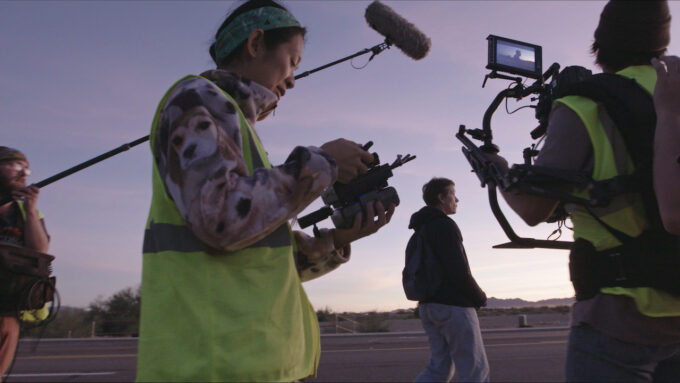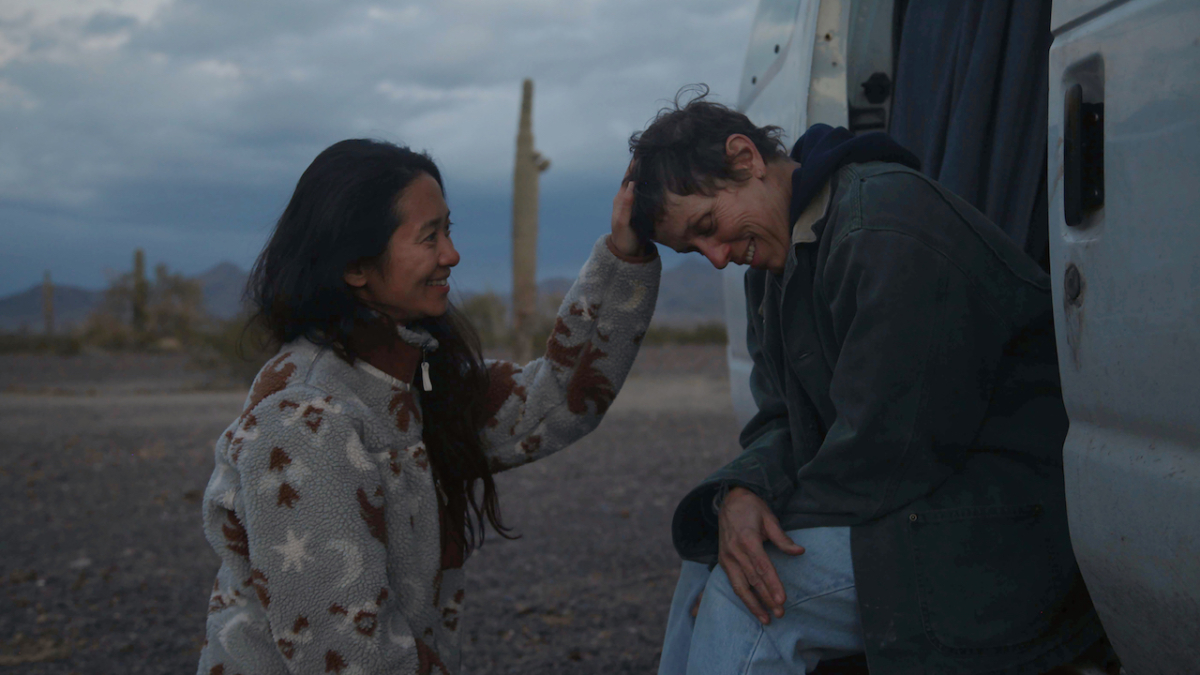Written By: Kyubin Kim
During a global pandemic when we are sequestered in our homes, road movies hit a certain kind of nerve. While watching director Chloé Zhao’s sprawling film “Nomadland” (2020) set across windy sea cliffs and sunsets stretching across America’s heartland, I felt an itch in my throat.
Is this what freedom looks like? Is this what it means to pioneer? Then I falter, is this the American story that it takes to legitimize a Chinese female director into mainstream success?
Based on Jessica Bruder’s 2017 nonfiction book, “Nomadland” follows Fern (Frances McDormand), a widowed van-dweller from Empire, Nevada. The film opens with the 2011 shutdown of mining corporation U.S. Gypsum. The Empire that we see in the film is in its economic “after”: an abandoned, zip code-less ghost town.
“Nomadland” is a film of hauntings, especially with the aftermath of the Great Recession in 2008. Fern is one of the displaced elderly nomads who work from paycheck to paycheck, “not homeless, just houseless” in her renovated van. Zhao is interested in who is left recuperating after the worst financial crisis in the 21st century (at least before our pandemic-halted economy), who is forgotten, and who chooses to leave and trudge forward.
It’s no surprise why critics call “Nomadland” a “character study.” Close-up shots press into two-time Academy Award-winning Frances McDormand’s aging wrinkles and stubborn independence. We peer into an intimate portrait of Fern, a woman grieving the death of her husband while nourishing a desperate need to live untethered.
You would expect a tiny cast with this “lone traveler” narrative, but being a nomad doesn’t mean there’s no community. Fern meets other nomads at a desert rendezvous: kind-faced coworker Linda May, cancer-stricken survivalist Swankie, Santa Claus-like leader (and famous YouTuber) Bob Wells, and other real-life nomads who play fictionalized versions of themselves on screen.
The nomads gather around a bonfire at night, a commune of older, poor, white Americans taking care of each other and living, truly living, on the road.
For many clear reasons, from the visuals to character depth, “Nomadland” is a pandemic release favorite, but it is not without controversy.
First, there is the issue of labor. These white-haired desert nomads are not retirees living in shiny RVs with washing machines and flushable toilets; these nomads enlist to work at the $15/hour Amazon CamperForce program and poop in plastic buckets. In the early scenes of the film, Fern works at an Amazon warehouse to prepare for winter. We watch her doing repetitive manual labor in a claustrophobic cubicle and then move on, back on the road.
But given Amazon’s poor track record of inhumane working conditions for their employees and the failed unionization effort in Alabama, viewers are not responding favorably to Zhao’s diluted commentary on Amazon as a means to an end. Zhao’s implicit Amazon slights are Chekhov’s gun moments wasted away instead of an opportunity to knock a punch at what American labor looks like today.
Second is the Chinese-born filmmaker’s controversy in China. Zhao, being hailed as one of America’s favorite Asian filmmakers in 2021, was expected to fill some big shoes for China. But when her 2013 interview with Filmmaker magazine resurfaced, calling China “a place where there are lies everywhere,” and Zhao was misquoted in another interview saying that “the U.S. is now my country,” instead of “[not] my country,” the damage was done. The film poster was removed from the internet and the hashtags #Nomadland” and “#NomadlandReleaseDate” were banned on Chinese social media.
Some Chinese citizens continue to lavish Zhao with support anyway, including major film critic Chu Mufeng, while others are not quick to share a homeland with her. One commenter replies: “An American female film director, thanks, don’t praise her too much.”
This point also leads into the elephant in the room: the disconnect between who Chloé Zhao is and the stories she chooses to tell. Zhao was born in Beijing, China to wealthy Chinese steel conglomerate royalty, and educated at a British boarding school before moving to the U.S. to attend high school, college, and graduate school to study film. The life she knows comes from socio-economic privilege and well-connectedness.
But the Westerns that Chloé Zhao directs are everything she doesn’t know. Her first two Western films, “Songs My Brothers Taught Me” (2015) and “The Rider” (2017), are set in Pine Ridge Indian Reservation in South Dakota. Pine Ridge is home to members of the Oglala Sioux Tribe, one of the lowest life expectancies in the Western hemisphere, and an unemployment rate upwards of eighty percent.
Chloé Zhao’s directorial modus operandi seems to be creating stories that allow us to empathize with a community we don’t belong to and don’t know much about. Her vision relies on being an outsider, a voyeur.
Before the making of “Nomadland” and before the pandemic, Zhao took a road trip across the American West. She remembers her trip fondly, before admitting, that in the last few months, that’s changed: “Now, during the pandemic — and coming from China — I feel for the first time since I started living in America that I’m not sure I want to hit the road for a while.”

It would have been nice to have this honest sentiment recognized in the film. But like every other Chloé Zhao film, there are no Asian faces in “Nomadland.” What is absent is more pronounced: stories about Asian and Asian American nomads, what elder care looks like for Asian American communities, and peering through a lens that is accessible to us. There’s a gaping incongruity here: between the film that does not explore Asian experiences and the film’s accolades that are always coupled with the Asian identity of the director.
Whether it is performative or genuine interest in Asian representation in film, the film industry has been showering Chloé Zhao with enthusiastic praise. In the 92-year-history of the Academy Awards, only five female directors were nominated for an Oscar for Best Director, let alone an Asian woman. This year, Chloé Zhao’s “Nomadland” earned six nominations at the 93rd Academy Awards, including Best Picture, Best Director, and Best Actress for McDormand. And this year, “Nomadland” will be competing head-to-head with Korean American director Lee Isaac Chung’s autobiographical film “Minari.”
It will be quite telling to see how the Oscars play out during a politically turbulent moment for the AAPI community in America, especially having a film about a Korean immigrant family side-by-side with a Western film about exclusively white nomads.
Whatever the outcome, Chloé Zhao can rest assured. She has other victories to come, the most notable being named the director for the fourth installment of the blockbuster Marvel series, “Eternals,” with a $200 million budget.
But will her victories be shared by the Asian American community at large? Chloé Zhao makes it possible for Asian women directors to be inducted into American film history. But does “Nomadland” actually show us that our stories, identities and lives can breach the ivory towers of American visual storytelling?
I still like and retweet when I see major film media outlets praising Chloé Zhao’s history-in-the-making moment as “the first Asian woman director to XXX!” Her accomplishments should be celebrated. Tokenized and virtue-signaling? Not so much. Chloé Zhao’s “Nomadland” is touching, but when it comes to trailblazing for Asian and Asian Americans, we should be the ones to determine our own cinematic triumphs outside of the validation of elite (#OscarsSoWhite) institutions.
For Asian and Asian American representation in film, the stories we tell are equally as important as the people who tell them. This might make identifying progress appear painstakingly slow, heartbreaking and tortuously empty. But it’s what we deserve. We should always be in a position to demand more, to demand stories of us.
“Nomadland” is available to stream on Hulu.

